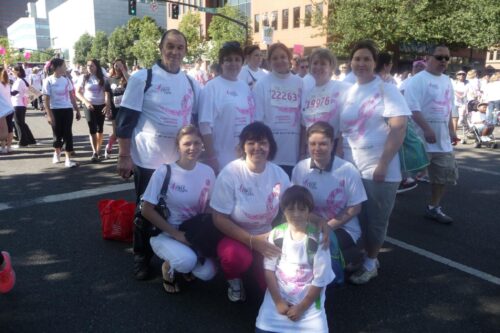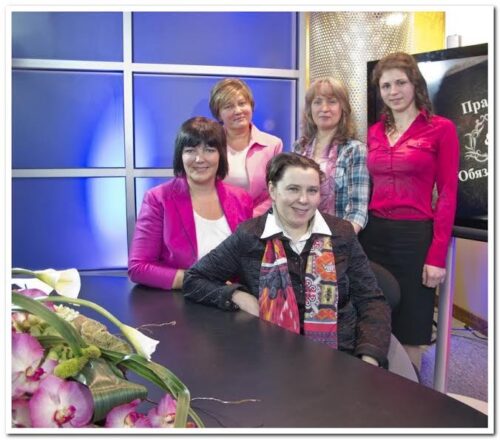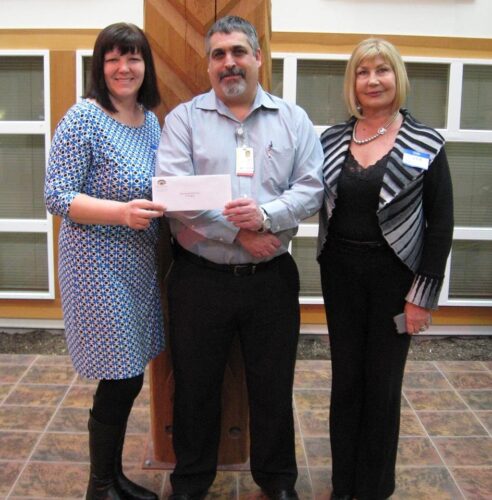Lilya Yevseyeva
Lilya Yevseyeva is a Seventh Day Adventist who immigrated to Oregon in 2002. Lilya is currently a resident of southeast Portland where she lives with her family and works at the Russian Oregon Social Services (ROSS) office as a women’s health awareness specialist. Lilya’s immigration experience begins back in her birthplace of Tajikistan.
Lilya’s family began their life in Tajikistan when her father, a member of the military, was stationed there as a border guard. Initially, Lilya’s family did not adhere to any religion, but that changed when they discovered and became members of the Seventh Day Adventist Church. This was a particular difficulty for their family, not only due to the official atheistic position of the Soviet Union but also due to Yevseyeva’s father’s membership in the Communist Party. Because he was a member of the Party, the family was under greater scrutiny and under constant threat: should the family’s beliefs and practices have ever been discovered, Lilya’s father would have been subjected to jail time. Lilya, the youngest child in her family, faced several discriminatory hardships during her childhood in Tajikistan. Particularly, Lilya’s family’s religious tenets prohibited the use of televisions, and as such Lilya’s family was not aware of official notices to change the time, and one day she was late for school and faced the insults and discrimination of her teacher and classmates for not knowing that the time has changed. Additional hardships arose around Lilya’s religion and the Komsomol. The Komsomol, or the All-Union Leninist Young Communist League, was the primary youth organization of the Soviet Union; Lilya’s religion made membership impossible for her, and as such placed her at a disadvantage for future professional activities. Her lack of membership disallowed her from attending medical university to pursue her dream career as a gynecologist. Instead, Lilya completed education for nursing and began work as a nurse in Tajikistan.
Shortly after Lilya finished her degree and began work, the Soviet Union collapsed and Tajikistan became embroiled in a civil war. This civil war arose out of a desire by ethnic minorities to acquire political equality, with the populist front represented primarily by jihadist-backed Muslims. This war left Tajikistan in an extremely unsafe state for Lilya, her husband, and their 8-month-old child. Lilya and her family immigrated to Russia in 1992 as refugees, where they settled in the central-Russian town of Samara along the Volga River. While there, Lilya lived with her uncle, although eventually her family built their own house in a
nearby village. Their life was still fraught with peril and persecution during their time in Russia. With Orthodoxy being the only officially supported religion, open worship as a Seventh Day Adventist was difficult for Lilya. Instead, she and other Seventh Day Adventist families had to meet in homes for worship to protect themselves from unfavorable opinions of others during the tumultuous times following the collapse of the Soviet Union. In an incident that shows the extent to which Seventh Day Adventist families were subject to skepticism and persecution, her supervisor went to research her religion at the library to make sure there were no risks of employing her (of course there were none). Ultimately, Lilya’s extended family members were granted refugee status in America, and this began her own process of immigration. Initially, Lilya’s brother offered her an invitation to immigrate to America as well as provide for her family as their sponsors in America. The process involved a lot of paperwork for Lilya, and also required her to travel to Moscow. In Moscow, Lilya went to the American Embassy to fulfill numerous requirements set forth by immigration officials to allow for her arrival. Among these, Lilya had to prove the discriminatory attitude towards her as a Seventh Day Adventist member in order to secure immigration as a refugee. The embassy officials did not find this sufficient and denied their status as refugees. Instead, they were granted parolee status, which required her to secure sponsorship. To continue with the process, the U.S. Embassy also required thorough medical examinations of Lilya and her family prior to their immigration. Because Lilya’s husband had been diagnosed with schizophrenia, the doctors at the embassy required for him to have a doctor in his final destination that would treat him. Fortunately, Lilya’s relatives were able to find a doctor in Portland for her husband and thus secured their permission to immigrate.

The ROSS Breast Health Education & Support Race for the Cure, 2012nearby village. Their life was still fraught with peril and persecution during their time in Russia. With Orthodoxy being the only officially supported religion, open worship as a Seventh Day Adventist was difficult for Lilya. Instead, she and other Seventh Day Adventist families had to meet in homes for worship to protect themselves from unfavorable opinions of others during the tumultuous times following the collapse of the Soviet Union. In an incident that shows the extent to which Seventh Day Adventist families were subject to skepticism and persecution, her supervisor went to research her religion at the library to make sure there were no risks of employing her (of course there were none). Ultimately, Lilya’s extended family members were granted refugee status in America, and this began her own process of immigration. Initially, Lilya’s brother offered her an invitation to immigrate to America as well as provide for her family as their sponsors in America. The process involved a lot of paperwork for Lilya, and also required her to travel to Moscow. In Moscow, Lilya went to the American Embassy to fulfill numerous requirements set forth by immigration officials to allow for her arrival. Among these, Lilya had to prove the discriminatory attitude towards her as a Seventh Day Adventist member in order to secure immigration as a refugee. The embassy officials did not find this sufficient and denied their status as refugees. Instead, they were granted parolee status, which required her to secure sponsorship. To continue with the process, the U.S. Embassy also required thorough medical examinations of Lilya and her family prior to their immigration. Because Lilya’s husband had been diagnosed with schizophrenia, the doctors at the embassy required for him to have a doctor in his final destination that would treat him. Fortunately, Lilya’s relatives were able to find a doctor in Portland for her husband and thus secured their permission to immigrate.

with friends & colleagues After they finished all the paperwork, Lilya’s family again traveled to Moscow, but this time to finalize their travel details to America. Lilya asked her relatives in Oregon to arrange their travel for them, which they did, and in 2002 Lilya flew out of Russia and arrived in Seattle, Washington, from where she traveled to her new home in Portland. Lilya’s first destination was her sister’s house in Portland, where her family stayed for half a year. To support herself and her family during this initial arrival period, Lilya went to the welfare arm of the Oregon Department of Human Services, from whom she received a $500 monthly cash assistance stipend. Additionally, Lilya relied on the jobs initiative of the Department of Human Services that helps individuals find work and get their footing financially. Lilya was taken around to hotels and other places of potential employment, finding work first as an estimator at Goodwill. However, this was not completely satisfying for Lilya and she pursued other avenues of fulfillment.
Lilya’s further acclimation began with her enrollment in nighttime English courses at Mount Hood Community College. The night classes took a toll and were difficult to commit to while also working full time during the day, so instead, Lilya found a janitorial job that allowed her to work in the evenings and focus her efforts on education during the day. Additionally, Lilya attended a healthcare training program at Portland Community College in surgical sterilization, after which she secured internships at Legacy Emmanuel Hospital and at Kaiser Permanente sterilizing surgical and dental equipment. In the meantime, Lilya was also working on securing permanent citizenship for herself and her family.

with the Russian Radio team in Portland, 2013
Upon her arrival, Lilya received a white card, and then a year later she received a green card indicating permanent residence, and then five years after that she was able to take her citizenship test. She is now a U.S. citizen, which allows her to be currently employed in social work. The transition in employment to her current job came in the late 2000’s, when Lilya joined Russian Oregon Social Services as a breast health awareness specialist. As part of her work, Lilya brings awareness to the issue of breast health and the importance of breast exams and mammograms for regular health. Lilya has led numerous presentations and writes for local Russian magazines on the issue.
Upon coming to America, Lilya was struck by the immense religious freedom that is afforded to all groups in America, and particularly the lack of any need to hide one’s worship – if anything, the opposite is true, with public radio stations that broadcast religious messages and public outreach programs. Similarly, she was impressed that anyone is able to pursue any avenue of employment, regardless of their religious background. By contrast, Lilya’s current work in medical fields that would not have been possible in her homeland; likewise, Lilya’s son is currently pursuing an education in law to one day become a lawyer, something which would have been much more difficult in their previous life. Other striking differences for Lilya were the relative cooperation and amity between people of disparate social and ethnic backgrounds.

Lilya Yevseyeva and the ROSS director Yelena Hansen receive the $15,000 check from Tribal Council, 2014
Lilya hopes to provide immigration aid to her brothers, who are currently still in Russia. On the whole however, Lilya is very satisfied with her life in Oregon and views herself as being a much better and well-rounded person for experiencing life in Tajikistan, Russia, and now Oregon.
This story is written by Martin Dorciak and it is based on his interview with Lilya Yevseyeva which Martin conducted August 8, 2014, in Portland, Oregon.

